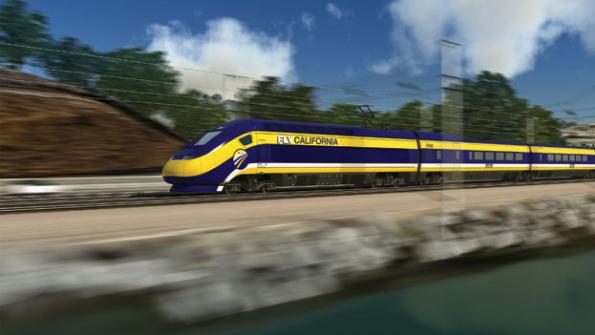California seeks federal boost for high-speed rail
In early April, California applied to the U.S. Department of Transportation for the entire $2.4 billion that Florida returned in March to use for a proposed high-speed rail line from San Francisco to Los Angeles. In a letter accompanying the application, Gov. Edmund Brown referred to California as "the only state moving forward to fulfill President Obama's promise of trains traveling over 200 miles per hour [mph] to connect significant portions of our population."
Florida's discarded funds would allow the California High-Speed Rail Authority (CHSRA) to move forward with the "backbone" of its project, which would run from Merced to Bakersfield with trains reaching speeds of 220 mph, as well as extend the line either north or south. California aims to create a high-speed, long-distance line that would connect the state's major cities and be competitive with airfare, says Jeffrey Barker, deputy executive director for communications, policy and public outreach for CHSRA. "We don't want to make a mistake where we attempt to do high-speed rail, but it's only planned for 85 miles," Barker says. "We are approaching this with a long-term vision."
CHSRA is optimistic about securing at least a portion of the funding. "We got half of Wisconsin's and Ohio's returned funds, and that was when Florida was a competitor," Barker says. However, dozens of other states and Amtrak also are vying for the returned money. In April, U.S. Department of Transportation Secretary Ray LaHood declared the Northeast Corridor an official High-Speed Rail Corridor, allowing Amtrak to apply for the funding. The declaration came after lawmakers from states in the area appealed to LaHood for the change. On the April 4 deadline, Amtrak requested $1.3 billion, with the money designated for overhauls of current infrastructure and new construction.
With a $43 billion price tag for the San Francisco to Los Angeles segment, California's timeline for the project is heavily dependent on funding, Barker says. CHSRA so far has secured $5.5 billion in state and federal funds. It also has access to nearly $10 billion in general obligation bonds approved by voters in 2008, as long as the amount is matched by federal money. The state is continuing the project's environment review process and plans to begin construction next year.
Success in California could lead to more rail projects in the rest of the country, says John Robert Smith, president and CEO of Washington-based Reconnecting America. "You have Republican and Democratic mayors and governors seeing the wisdom of being involved in high-speed rail," Smith says. "As with the Interstate Highway System, it starts somewhere and creates the vision for how it can unfold in their own state."




















